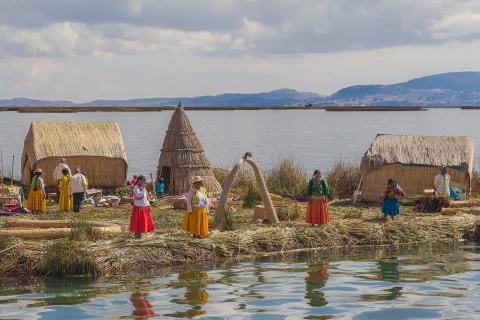
The following is an excerpt from a manifesto endorsed and signed by 74 Indigenous peoples and organizations represented at the March 2023 UN Water Conference.
The following article was published in the May-June 2023 issue of NewsNotes.
We categorically affirm that Indigenous Peoples around the world continue to be primary actors in the care, protection and regeneration of water based on our deep and long-standing spiritual, cultural and economic relationships with water in all its forms and sources.
For Indigenous Peoples, water is an inherent and inalienable right and responsibility. We are water and without it we would not exist.
We therefore reject absolutely the commodification, privatization and dispossession of water being implemented by states and private sector entities around the world. Our original sources of water are being diverted to urban areas, mega-dams, extractive industries, and large-scale agriculture production, systematically violating our inherent, internationally recognized rights, inter alia, to self-determination, self-government and autonomy, means of subsistence, health, lands, territories and natural resources, and Free, Prior and Informed Consent. These policies and practices result in repressive and often violent outcomes for Indigenous Peoples, depriving us of our traditional lands and territories, diminishing and contaminating our water sources, and further contributing to the water crisis we are facing in our homelands caused by climate change.
We are deeply concerned that current national and international policies continue to allow widespread deforestation, mining, drilling and use of highly toxic agro-chemicals, contaminating water systems that nurture millions of species around the world. We are particularly concerned by the continuing contamination and poisoning of water sources by toxic waste produced by mining and drilling activities. These include contaminants such as mercury, which have well-documented, devastating impacts on maternal, child and intergenerational health and development. Many of these extractive activities also contribute directly to the global climate crisis and further diminish Indigenous Peoples’ capacity to adapt.
We affirm that Indigenous Peoples continue to carry out a vital role in the protection of the Natural World and its original biodiversity. We continue to maintain and practice our sacred responsibilities as caretakers and protectors of water in all its forms including rivers, streams, lakes, springs, rain, snow, ice and oceans. We will continue to do this as an unwavering commitment. However, for us to realize and implement this commitment, it is essential that global institutions, international organizations, national, regional and local governments, as well as national and transnational corporations fully recognize and respect our rights. These include rights affirmed in Convention 169 of the International Labor Organization on Indigenous and Tribal Peoples in Independent Countries, the American Declaration on the Rights of Indigenous Peoples, the United Nations Declaration on the Rights of Indigenous Peoples and the rights affirmed in Nation- to-Nation Treaties and Agreements with settler governments.
We insist that all initiatives related to water, and specifically those that are carried out within our traditional lands and territories, be undertaken only with our Free, Prior and Informed Consent and full participation in decision-making by our authorities and representatives designated by our own Peoples. We reject the manipulations being carried out by some States to circumvent the true representation of Indigenous Peoples through falsified or watered-down consultation processes.
We also call upon States, international agencies, financial institutions, and the United Nations System to support all initiatives and actions developed by Indigenous Peoples regarding water, respecting the self-determination, autonomy, and self-government of our Peoples according to our own forms of organization, land tenure, and resource management systems.
We endorse the contributions to advance the respect and defense of our rights developed in the thematic reports presented to the Human Rights Council and the UN General Assembly by the Special Rapporteurs on the Right to Water and Sanitation, the Special Rapporteur on Toxics and Human Rights, and the Rights of Indigenous Peoples. We also welcome the recommendations of the UN Permanent Forum on Indigenous Issues and the Expert Mechanism on the Rights of Indigenous Peoples in this regard.
Finally, we condemn and reject with one voice the systematic repression, persecution, kidnapping, assassination and criminalization of Indigenous Peoples and their authorities, leaders, and representatives who are defending their rights to lands and territories including their right to water. We also reaffirm the essential role of Indigenous women as water protectors, water defenders and water knowledge holders and call for their practices, and contributions and leadership to be recognized and safeguarded. §
Photo of the The Uros Tribe by Shawn Harquail 2014, CC
